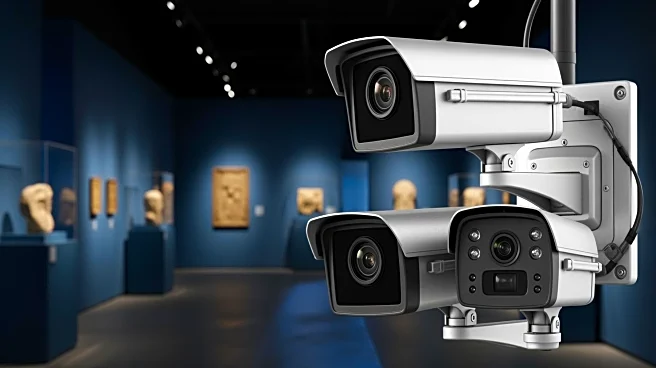What's Happening?
The recent theft at the Louvre Museum, involving over €88 million worth of jewels, has been attributed to a group of 'petty criminals' rather than a professional crime syndicate, according to Paris prosecutor
Laure Beccuau. The heist, which took place on October 19, saw the theft of significant historical pieces, including a brooch belonging to Empress Eugénie and a royal necklace. Four suspects have been charged, three men with extensive criminal records and a woman accused of complicity. The suspects hail from Seine-Saint-Denis, a district north of Paris. Despite their criminal backgrounds, their previous offenses do not align with high-level organized crime, suggesting a shift in criminal profiles. The investigation continues as the fourth suspect remains at large, and the stolen jewels have yet to be recovered.
Why It's Important?
This incident highlights vulnerabilities in museum security and raises concerns about the ability of local criminals to execute high-profile heists. The theft of such valuable and historically significant items underscores the need for enhanced security measures in cultural institutions. The involvement of individuals with no prior connections to organized crime networks suggests a potential shift in criminal activities, where smaller groups may attempt more ambitious crimes. This could lead to increased pressure on law enforcement agencies to adapt their strategies and improve surveillance and security protocols in museums and other vulnerable sites.
What's Next?
Authorities are continuing their search for the remaining suspect and any additional accomplices involved in the heist. The investigation may lead to a reassessment of security measures at the Louvre and other museums to prevent future incidents. The case also prompts a broader discussion on the need for improved security technologies and protocols in cultural institutions. As the investigation unfolds, there may be further arrests and potential recovery of the stolen jewels, which would be a significant development in resolving the case.
Beyond the Headlines
The Louvre heist could have long-term implications for museum security policies worldwide. It may prompt a reevaluation of how cultural institutions protect their collections, potentially leading to increased investment in security technologies and personnel training. Additionally, the incident raises ethical questions about the preservation and protection of cultural heritage, especially in an era where such treasures are increasingly targeted by criminals. The case also highlights the challenges faced by law enforcement in adapting to evolving criminal tactics.











